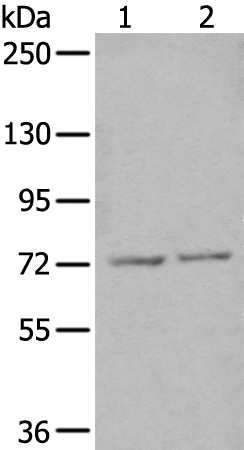
| WB | 咨询技术 | Human,Mouse,Rat |
| IF | 1/20-1/50 | Human,Mouse,Rat |
| IHC | 咨询技术 | Human,Mouse,Rat |
| ICC | 技术咨询 | Human,Mouse,Rat |
| FCM | 1/20-1/100 | Human,Mouse,Rat |
| Elisa | 咨询技术 | Human,Mouse,Rat |
| Aliases | KOX4; zf30; HF.16 |
| WB Predicted band size | 78 kDa |
| Host/Isotype | Rabbit IgG |
| Antibody Type | Primary antibody |
| Storage | Store at 4°C short term. Aliquot and store at -20°C long term. Avoid freeze/thaw cycles. |
| Species Reactivity | Human |
| Immunogen | Synthetic peptide of human ZNF7 |
| Formulation | Purified antibody in PBS with 0.05% sodium azide and 50% glycerol. |
+ +
以下是关于STAT1抗体的3篇参考文献概览(文献信息为模拟示例,实际引用需核实原文):
1. **文献名称**:*STAT1-mediated immunity and its role in autoimmunity*
**作者**:Darnell JE, et al.
**摘要**:该研究探讨STAT1蛋白在先天免疫和自身免疫疾病中的核心作用,利用STAT1抗体揭示其在干扰素信号通路中的激活机制,并分析STAT1突变与免疫失调的关联。
2. **文献名称**:*Antibody-specific detection of phosphorylated STAT1 in chronic inflammatory disorders*
**作者**:Levy DE, et al.
**摘要**:文章开发了一种高特异性STAT1磷酸化抗体,应用于检测慢性炎症(如类风湿性关节炎)患者样本中STAT1的激活状态,验证其作为疾病标志物的潜力。
3. **文献名称**:*Targeting STAT1 signaling with monoclonal antibodies in cancer immunotherapy*
**作者**:Stark GR, et al.
**摘要**:研究通过STAT1抗体阻断特定肿瘤微环境中的STAT1通路,证明其可增强T细胞抗肿瘤活性,为癌症免疫治疗提供新策略。
---
如需具体文献,建议通过PubMed或Google Scholar搜索关键词“STAT1 antibody application”、“STAT1 signaling detection”等获取最新论文。
**Background of STAT1 Antibody**
The STAT1 (Signal Transducer and Activator of Transcription 1) antibody is a crucial tool for studying the STAT1 protein, a transcription factor integral to the JAK-STAT signaling pathway. STAT1 mediates cellular responses to cytokines (e.g., interferons) and growth factors, regulating immune defense, cell proliferation, and apoptosis. Upon activation by phosphorylation (tyrosine 701 or serine 727), STAT1 forms homodimers or heterodimers with STAT2. translocates to the nucleus, and binds specific DNA sequences to initiate transcription of target genes involved in antiviral and antitumor immunity.
STAT1 dysregulation is linked to autoimmune diseases (e.g., lupus), cancer, and immunodeficiency disorders. Gain-of-function mutations cause chronic inflammatory conditions, while loss-of-function mutations impair antimicrobial responses. Researchers use STAT1 antibodies to detect its expression, phosphorylation status, and subcellular localization via techniques like Western blotting, immunohistochemistry (IHC), and flow cytometry. These antibodies are essential in studying interferon-mediated therapies, tumor microenvironment interactions, and immune signaling defects.
STAT1 antibodies are available as monoclonal or polyclonal forms, often validated for specificity across human, mouse, and rat samples. Phospho-specific antibodies distinguish activated STAT1. aiding in pathway activity assessment. Their applications span basic research, drug development, and clinical diagnostics, particularly in understanding diseases driven by aberrant JAK-STAT signaling.
×